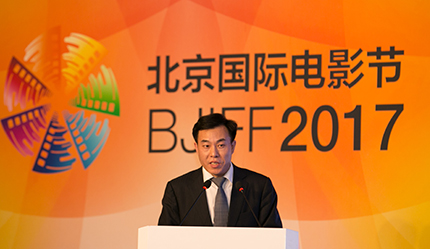The 7th BJIFF
Internet Plus Brings About Great Changes to Chinese Film Industry
On the afternoon of April 18, China Film Distribution Summit of the 7th Beijing International Film Festival was held at Beijing International Hotel. Li Guoqi (Vice Minister of the Film Bureau of the State Administration of Press, Publication, Radio, Film and Television of the People's Republic of China) and Jiang Ping (General Manager of China Film Co., Ltd.) attended the summit and delivered speeches. Other leaders who attended the summit include: Hu Dong (Deputy Director-General of the Beijing Municipal Bureau of Press, Publication, Radio, Film and Television), Bian Jianguo (Associate Counsel of the Beijing Municipal Bureau of Press, Publication, Radio, Film and Television), and Liu Yuxia (Director of the Market Division of the Film Bureau of the State Administration of Press, Publication, Radio, Film and Television of the People's Republic of China).
The summit was organized by China Film Co., Ltd. and presided over by Jiang Xiaohan and Zhao Ningyu (as the guest host). Guests who attended the summit include: Zhou Baolin (Deputy General Manager of China Film Co., Ltd.), Huang Qunfei (First Deputy General Manager of Huaxia Film Distribution Co., Ltd.), Zeng Maojun (President of Wanda Cinema Line Corp), Jiang Zhiqiang (President of EDKO Films Ltd.), Peter Loehr (CEO of Legendary East), Kang Li (President of Maoyan Pictures), and Yang Dan (Senior Vice President of Weying Technology Co., Ltd.).
As one of the major forums of the 7th BJIFF, China Film Distribution Summit, with the theme of "Thought on Film Distribution and Internet Plus Under Multiple Environments", focuses on current hot topics of China's film distribution, explores development direction of the distribution market, and discusses the role of Internet Plus as a booster in the film distribution market, analyses the market status rationally, calls for orderly development of the market, further publicizes and implements the regulations of the Film Industry Promotion Law, and emphasizes industry self-regulation and supervision.
Fine Works Are Fundamental to the Growth of Chinese Films

Li Guoqi, Vice Minister of the Film Bureau of the State Administration of Press, Publication, Radio, Film and Television of the People's Republic of China
I am in charge of distribution at the Film Bureau. On this occasion, I would like to say something about the recent plans of the bureau.
In recent years, especially since the 18th CPC National Congress, Chinese films have developed rapidly and made remarkable achievements as follows:
First, creation: China's film creation has stayed vital, Chinese films have become more diversified, substantial and positive, great breakthrough has been made in main-themed films, and China has created a lot of outstanding films benefiting the society and economy.
Second, industry: Recent years have seen the strong momentum of China's film industry. China's total box office earnings were just over RMB 10 billion in 2011, but approached RMB 50 billion at the end of last year. We have never seen an annual increase of RMB 10 billion in the international film market. Such substantial market growth has been attributable to improved creation and cinema construction. With more than 43,000 film screens by the first quarter of this year, China has become the country with the most film screens in the world, and been ranked second in box office in the world, behind North America only. Therefore, in terms of film market development, China has been ahead of others.
Third, Chinese films have become increasingly influential in the world. In recent years, a multitude of outstanding Chinese directors, actors and producers have gone out for film production in Hollywood and across the world; on the other hand, some Chinese films were distributed and screened abroad, and achieved brilliant results. This shows the important role of Chinese films in the world.
Fourth, reserve of Chinese film talents has played its role. New Chinese filmmakers are standing out as a creation group and gradually becoming the nucleus assuming the heavy mission of Chinese films.
The achievements of Chinese films aside, we are supposed to see Chinese films are facing a lot of challenges and films are at a new turning point of reform deepening and accelerated development. First, film creation is facing severe challenges. Generally speaking, there are few good films recognized by the market and viewers, which is decisive to the leap of Chinese films. Second, the challenges from the market are also severe. As distributors, we can deeply feel the challenge from the Internet which is eating into the market share. We also feel that a huge and high-quality film viewer group is taking shape in China according to the figure of 1.372 billion viewers registered last year. But retaining these viewers and winning over more calls for all-round efforts in creation, distribution and marketing.
Based on the situation of film development this year, the Film Bureau has established two priorities: First, taking this year as a year of film quality promotion for the purpose of creating fine works which are fundamental to film growth. Second, taking this year as a year of market standardization, we will strengthen administration and standardize the film market to make it more healthy and fair.
Take the Express of "Internet Plus" for Constant Development

Jiang Ping, General Manager of China Film Co., Ltd.
I was a witness to the prosperity of Chinese films in the past decades. 24 years ago, I was working on the 1st Shanghai International Film Festival. I can clearly remember that there was a film distribution meeting (not named "forum" then) scheduled for an afternoon of 1993, but regrettably 20 of more than 50 managers we had invited from provincial and municipal companies across the country with difficulty left secretly. Why? There was a press conference for Sophia Loren in a cinema that afternoon. They did not keep the distribution meeting in their hearts. Today, we also have a lot of press conferences, and many stars and tycoons are meeting our friends in the filmdom across Beijing, but I was so amazed and moved that today's forum is packed. This shows that Chinese film industry has been developing in a rational way, and a must step with distribution as the key has been formed.
Since the 21st century, mobile Internet and big data have developed rapidly. The growth and coverage of the new economy represented by mobile Internet are beyond imagination. What life will be like without mobile phones or Internet? Internet is indispensible to all Chinese and all filmmakers. "Internet Plus" is posing a new challenge to industrial transformation and upgrading at a whirlwind speed. Let's take the express of "Internet Plus" for in-depth transformation, cross-border integration, integration into the era and constant development.
Film Distribution Should Be Developed in Depth Under Diversified Environment

Zhou Baolin, Deputy General Manager of China Film Co., Ltd.
The diversification is formed upon self-optimization and constant improvement and is an inevitable result and stage during the development of film industry. It is the profound change of the overall environment that gives birth to the diversification of film distribution.
The diversification is mainly reflected in the following aspects: 1) Diversified subjects. China Film Distribution was the leader of the industry. With the advent of market economy, the subject is changed. Despite of the several thousand filmmaking institutions, the new forces engaged in distribution are emerging. A lot of new distributors have made great achievements and distributed many successful films. 2) Diversified capitals. There are more and more capital operations across industries, especially in Internet and finance industries, and more and more investors, including state-owned, private and mixed-economy institutions as well as film distributors. 3) Diversified marketing methods. In the past, the film posters were only labeled on the guideboards, materials were only sent to cinemas and media made some reports. For now, the marketing methods, traditional or innovative, are emerging in endlessly, such as box office subsidy, minimum guarantee and advance payment for publicity. 4) Diversified competitions. The BJIFF 2016 witnessed fierce competitions among distributors for over 700 films in various aspects, such as the scale for market occupation, capability of distribution in major cinemas, retention period in cinemas and the acquisition of desirable films. In addition, cinemas also start competitions. In some flourishing region, there are five to six cinemas within one kilometer, showing highly fierce competitions.
Under the diversified environment, film distribution should be developed in depth with broadened thinking based on Internet, such as the intervention and follow-up at the initial stage of filmmaking.
Tendency of Diversification of Chinese Audience is Still Poor

Zeng Maojun, President of Wanda Cinema Line Corp
Speaking on the rostrum as a guest, I am a perfect reflection of the diversified Chinese film industry. In 2002 when China launched the reform of cinema line system, private capital entered the market, and then Wanda made a great success.
The film diversification is mainly determined by several aspects: 1) Interest. The diversified film contents are now highly obvious, and different types of films have their own living space. 2) Audience. Contents are at the front end while audience at the rear end. In the future, the age distribution of Chinese audience will be more diversified. For now, the tendency of diversification of Chinese audience is still poor. A good film may record a box office of RMB 3 billion, such as The Fate of the Furious now being screened in China. But the box office for the other Chinese films may be deficient due to the poor diversification of the audience. 3) Method and terminal of distribution. The major Internet platforms started the film distribution and production from e-commerce. All the companies are striving to open up the upstream and downstream of the industry chain. The diversified and orderly competitions facilitate the rapid development of Chinese film industry.
Diversification Boasts Significant Advantages and Complexity

Peter Loehr, CEO of Legendary East
I started film distribution in China since 1997 when I visited over 30 cities without any assistance. Therefore, considering the diversification, it is important to say that the partners are diversified. In the past nine months, we are lucky to see three films earning a box office of over RMB 1 billion, which is very rare. I believe the success is owing to their high-quality production and artistic standards. Chinese viewers are very picky.
Secondly, our team members are from different places of China instead of the world and professional in making domestic films, which is beneficial for our operation.
Thirdly, we have many partners in the three films, including China Film Group Corporation, Huayi Brothers and LeEco. We are a Chinese company, and our campaign teams should make success in dealing with different companies through different channels. In the past, it was enough if the media or materials are good. Now the diversified environment is very complex in fact. Especially for the companies like us depending on a small number of films for survival, diversification requires a good coordination of many participants. For now, a film company or distributor is difficult to have all done. The ticketing website is of greater significance and also an important issue for now.
Diversification boasts significant advantages and complexity
More Complicated Market and More Diversified Distribution

Huang Qunfei, First Deputy General Manager of Huaxia Film Distribution Co., Ltd.
The emergence and intervention of Internet make our market more and more complicated, and our distribution more and more diversified. Firstly, the distribution channels are diversified. In the past, the only channel available was the big screen, and now we are developing from the big screen to multiple screens. Secondly, the distributors are diversified. Besides traditional distribution companies, there are also numerous new media and Internet distributors. Thirdly, the distribution modes are increasingly compound. Distribution was very easy, which called for just positive publicity and cooperation with cinemas in scheduling. Now there are a large variety of distribution modes, including pre-sale, guaranteed distribution, etc. Fourthly, the distribution capital is becoming more and more financial and complicated… As I see, Internet changes the film industry and the distribution sector in the most profound way. This is the biggest factor.
Intervention of Internet is Changing Chinese Film Distribution Rapidly

Jiang Zhiqiang, EDKO Films Ltd.
I will talk about the development of film industry in the past few years from the angle of a producer. When Hero was distributed over a dozen years ago, the conditions were totally different from today. With the time passing by, I get more and more confused. Because of the intervention of Internet, the changes of film distribution in China are the fastest.
When we are about to distribute a film in the US, we still use some traditional methods, such as advertising a lot on TV. But in China, a lot of distributors don’t buy advertisements on TV, because the choices of Chinese viewers are completely controlled by the Internet. As a practitioner in the film industry, I think if we want to know how to distribute films in China, we have to be aware of how the viewers spend their money. If an Internet company knows how to control the consumption of film viewers, it will be well-placed in the film distribution industry.
Our viewers rely heavily on the Internet, and the relationship between Internet companies and film distribution will become closer and closer, because they are the media platform with the most viewers. I have rich experience, but now we really cannot use what we used before. These are my opinions and thoughts about future.
Share the Capability of Forecast and Judgment to the Industry

Kang Li, President of Maoyan Pictures
Films, in nature, feature irregularity, fluctuation and risks. The users’ platforms and data capacity in our hand, including exploitation in users’ behaviors and tracks actually help us enhance the forecast and judgment to the operations of the whole chain of the film industry and share the capability of forecast and judgment to the industry to improve the industry recognition and understanding, which is actually a valuable work we are doing. Specifically, at the initial stage of film publicity and distribution, the intentions or viewing tracks by users can actually help conclude many instructional and predictable behaviors and judgments helpful for publicity and distribution, which are very meaningful.
We would like to become a film company closest to Chinese viewers with full exploitation. Since filmmaking has high risks, we have been emphasizing internally that no second chance is given to film, in all links like creation, production, publicity and distribution. We are striving to make the accumulation of data and users become an effective tool and measure for us to strengthen accuracy.
We Need to Know Where Viewers Are

Yang Dan, Senior Vice President of Beijing Weying Technology Co., Ltd.
In the 112-year Chinese film industry, we are just two years old. Besides the features mentioned just now, some new market features are highlighted by the diversification, such as fragmentization and decentralization. In the past, an advertisement in the cinema caught the viewers of the next film. But now, it is totally changed. We need to know where the viewers are.
Viewers are scattered in the ocean, while the online ticket booking channel may be a river. As in the case of the migration of Alaskan salmon, if a brown bear is squatting on a proper rock, it is the best way to touch the shoal.
Internet provides an opportunity under the decentralization and fragmentization. We hope to share our capacity in dealing with data and users with the industry to achieve a win-win outcome.
Released on:April 19,2017
